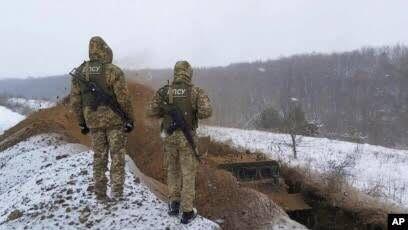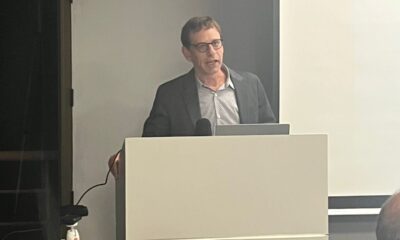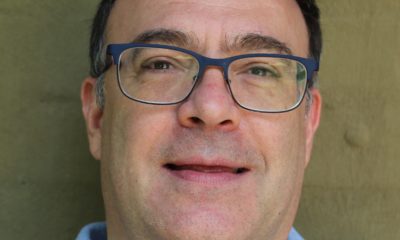
Community

Ukrainian Jews remain calm amidst threat of Russian invasion
The world is holding its breath as it watches Russian troops amassing on Ukraine’s border, threatening invasion or war. Warnings of the possibility that world powers could use nuclear weapons have upped the sense of fear and panic. For Jews living in Ukraine or with ties to the region, it has been a particularly frightening time, but they say much of it is “psychological warfare”, and for now, they’re staying put.
Speaking to the SA Jewish Report from Odessa, a member of the Jewish community, Sana Nelina, said, “The population of Odessa is around one million people. The Jewish population is about 30 000 to 35 000. This means that the Jewish community of Odessa is large and vibrant. We have about 16 different Jewish organisations on the ground including Orthodox, Conservative, Progressive, and non-religious institutions for people of different ages and needs, which is supportive and meaningful.
“The situation in Ukraine has had a definite influence on our city and its population. All the Jewish organisations feel anxious, but are trying to stay calm to avoid panicking. Partner organisations in the United States and Israel are in the loop, paying close attention to even minor changes or news. The mood of Jewry isn’t yet fully formed, but people are definitely concerned.”
She says she’s fearful, “due to the informational escalation on social media. I haven’t had a TV for more than five years, but the social networks are full of different news. It touched me somehow and shook my confidence.”
Still, she’s staying where she is for now. “My dad lives in the city not far away from me. He’s 75, and it would be hard for him to move. But if we face real danger, we will think of this possibility. I hope there will be no need.”
Speaking to the SA Jewish Report from Kyiv, Ilya Bezrucho says “staying is the most responsible thing to do”. The economy has been badly affected by the current crisis, so staying, running a business, and supporting friends and family is “one of the most powerful things you can do”.
He also believes it’s important not to spread panic, and to stay calm. He believes it’s psychological warfare and “a political game” between Russian president Vladimir Putin and other world leaders, and Putin won’t act on his threats.
The main effects have been the hoarding of goods and fuel, which creates even more panic, Bezrucho says. “The elderly are especially affected as they remember previous wars, and there are many elderly people in our Jewish community.”
Adam Kuleshov, who is from Ukraine but now lives in Israel, says, “I have relatives who live in Odessa. I also have a lot of friends in many cities: Kyiv, Odessa, Lvov, Dnepropetrovsk, and so on. Most of them are worried because Russia regularly uses heavy artillery to shell cities while they are behind the border. They use the same war techniques as the Palestinians – they launch rockets from living areas, near kindergartens and schools.
“It’s important to take into account the fact that Ukraine is a Christian country where Jews have always been in a risk group ‘responsible’ for the crucifixion of Jesus,” Kuleshov says. “This ‘memory’ is alive through Ukrainian history and culture, and far from eradication. Antisemitism is quite common in Ukrainian literature. Especially in Western Ukraine, the attitude to Jews is harsh.
“The second thing to note is that some of the most prominent oligarchs in Ukraine are Jews, such as Dmytro Firtash, Ihor Kolomoyskiy, and current president, Volodymyr Zelensky. And of course, many grievances are associated with their rule. The inability of the current president to govern the country effectively is often confused with his Jewish roots and the conspiracy that he became president in order to ‘harm’.”
In addition, there are a huge number of far-right extremist groups in Ukraine. “[Evidence of] their radicalisation emerged during the riots in 2013 to 2014, and their subsequent enrolment into the Ukrainian army to fight Russians. From one point of view it was good, as many volunteers joined the UDF (Ukrainian Defence Forces). From another point of view, these groups were also active in attacking the Jewish community (although these attacks weren’t massive), and blaming them for all bad things,” Kuleshov says.
He says that while the “Soviet regime is over, and there’s no fear of identifying as Jews, there are still many conspiracies and crazy beliefs held by common people that Jews are part of a ‘deep state’ that rules Ukraine and uses it for its own purposes. But, today’s most popular narrative is that the main enemy of Ukraine is Putin.
“So, considering the fact that Putin is the main enemy of Ukrainians, I don’t believe that in the current situation, the Jewish community of Ukraine can be affected much,” he says. “The threat of attacks from extremists always exists. But such attacks will be sporadic and disorganised rather than massive.
“It’s safe to say that on the platforms and forums of the right and radical-right Ukrainians, a surge of antisemitic narratives is noticeable. But there are no complaints about Jews in the media and print media. From this, we conclude that the main threat to the Jewish community of Ukraine is still representatives of fascist, nationalist, and antisemitic underground movements. They aren’t united in their activities, don’t have common command centres, and are scattered across the vast territory of the country.”










